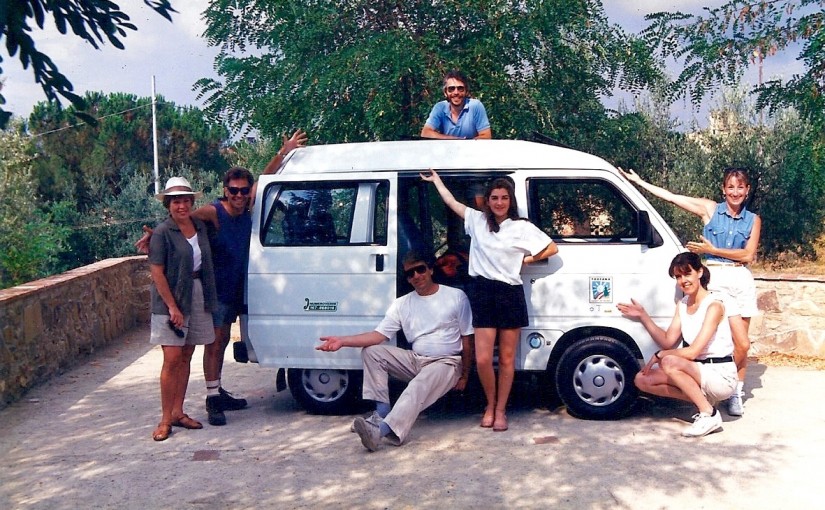In 1975, I lived in Firenze for a little over three months. It was a different city forty-one years ago, if not in form, very much so in tone. Always a destination, in those days it also seemed provincial, intimate, local. Gelateria Vivoli was a unadorned counter open to the street where a small cup of ice cream cost 350 lire (something like 35 cents.) I dined almost every day at 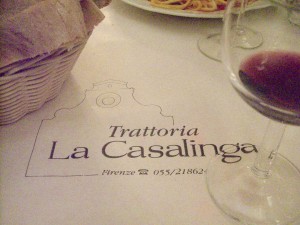 Trattoria La Casalinga for about two dollars in its single high-ceilinged room, Paolo amazing me by his dexterous way with dishes and good-humored dealings with customers. I waited for friends on Ponte Vecchio while watching Italians of my age, arms linking them into human chains, tease and flirt and rebuff. I learned to identify the provenance of tourists crossing the bridge by the manner of their gait. The open air markets near San Lorenzo offered more than leather. Blood oranges, the preferred citrus, were exotic and luxurious.
Trattoria La Casalinga for about two dollars in its single high-ceilinged room, Paolo amazing me by his dexterous way with dishes and good-humored dealings with customers. I waited for friends on Ponte Vecchio while watching Italians of my age, arms linking them into human chains, tease and flirt and rebuff. I learned to identify the provenance of tourists crossing the bridge by the manner of their gait. The open air markets near San Lorenzo offered more than leather. Blood oranges, the preferred citrus, were exotic and luxurious.
All those particulars have changed. Tastes, styles, customs, and economies do that. That it was special for me in those special weeks of four decades ago, means nothing to the enormity of time. I alone am responsible for casing those memories in amber so I can look at them now and again and relive the warmth of their distant sun.
Towards the end of that Florentine spring, my Italo-American friend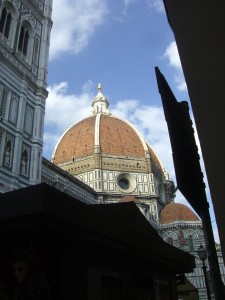 suggested that with the challenges of life and money and time ahead of us, it was likely neither he nor I would return for at least ten years. To a twenty-five year old man ready for adventure, the idea was terrifying and absurd.
suggested that with the challenges of life and money and time ahead of us, it was likely neither he nor I would return for at least ten years. To a twenty-five year old man ready for adventure, the idea was terrifying and absurd.
For years afterward, I only visited Firenze in a dream. I’d arrive by train, the towers and domes of the town visible in the distance. I’d run from the station into the streets, tears streaming as I neared Piazza delle Signorie, then before the copy of Michelangelo’s David would fall to my knees to kiss the ground. There is probably enough Jungian symbolism in that dream to fill a dissertation. The nocturnal opera played in repertory for two decades.
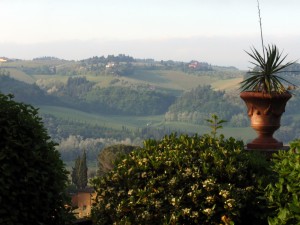 In 1995, I finally returned to the city while awake. Seven of us lived in a restored 15th century farmhouse set among olive groves and vineyards. To the forty-five year old man still ready for adventure, being there was more relief than thrill, and strangely, a little bit sad. Firenze had become more prosperous. I felt stuck in time.
In 1995, I finally returned to the city while awake. Seven of us lived in a restored 15th century farmhouse set among olive groves and vineyards. To the forty-five year old man still ready for adventure, being there was more relief than thrill, and strangely, a little bit sad. Firenze had become more prosperous. I felt stuck in time.
Two years later, another group of us visited Lazio; we lived in a 16th century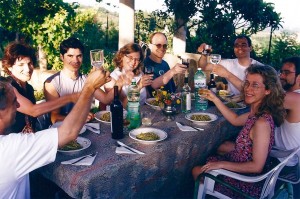 farmhouse set among olives and vines. The nearest town, Roccalvecce, though not geographically remote, was remote in other ways – suspended, not of any particular era. We cooked, feasted, hunted scorpion, toured neighboring towns, and sat on the terrace at nights, debriefing our days while we gazed at a floodlit Palazzo Costaguti, the moon courting its ramparts.
farmhouse set among olives and vines. The nearest town, Roccalvecce, though not geographically remote, was remote in other ways – suspended, not of any particular era. We cooked, feasted, hunted scorpion, toured neighboring towns, and sat on the terrace at nights, debriefing our days while we gazed at a floodlit Palazzo Costaguti, the moon courting its ramparts.
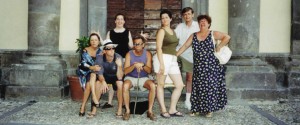 A dozen more visits — Lazio, then Orvieto, then both with Firenze tucked in whenever possible — spread over another rapidly flowing twenty years. Though I grew older, my friends here never did; a pleasant and somehow necessary illusion. I worked hard to know Italy, to understand its culture, to learn the language, to be a part. As I am a man of the theatre, I cultivated a faith in confidence, that it could outstrip actual knowledge. Another level down I feared that real knowledge was out of reach, that pretense would always have to suffice.
A dozen more visits — Lazio, then Orvieto, then both with Firenze tucked in whenever possible — spread over another rapidly flowing twenty years. Though I grew older, my friends here never did; a pleasant and somehow necessary illusion. I worked hard to know Italy, to understand its culture, to learn the language, to be a part. As I am a man of the theatre, I cultivated a faith in confidence, that it could outstrip actual knowledge. Another level down I feared that real knowledge was out of reach, that pretense would always have to suffice.
When I visited Orvieto and Firenze with my friend Barbara last May it was, in part, to see if I liked it enough to allow weeks to turn into months, even years. By the end of the first day here, it had become clear that were these flirtations with Italy ever to turn serious, they had better turn soon. My knees already depended on glucosamine for flexibility, other inflexibilities would soon follow. To delay was to be foolish with time.
Touring gorgeous countryside, dining at superb restaurants where prices are lower tha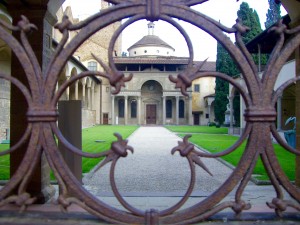 n at mediocre ones at home, meeting kind people who praise my rudimentary Italian; I could like that, but it didn’t convince me I belong. Then one afternoon while driving alone (after failing to rouse friends in Monterubiaglio by ringing a doorbell I later found did not work) I passed through an industrial zone on a rough road and heard myself say over and over “I really love it here.”
n at mediocre ones at home, meeting kind people who praise my rudimentary Italian; I could like that, but it didn’t convince me I belong. Then one afternoon while driving alone (after failing to rouse friends in Monterubiaglio by ringing a doorbell I later found did not work) I passed through an industrial zone on a rough road and heard myself say over and over “I really love it here.”
I scooped up the life maps I’d been peering at, and tossed them away. The new map was a list of things official and logistical that needed doing: deadlines, timelines, underlines, airlines, passport lines, train lines, credit lines. Such things frighten me. The actor’s confidence has never extended to believing I can find my way through the complications human society throws in front of all forward motion. However, I had heard myself say how much I loved being in Italy while driving on a back road that offered only the autostrada and an industrial installation as scenery. It was no longer a matter of choice.
I have a habit – one likely shared with almost every human being on the planet – of needing to justify… well, almost everything I do. Multiply that by a factor of six hundred when that thing I’m doing is outside the life I believe I am supposed to lead. The life I believe I am supposed to lead should a) make me lots of money, b) get me lots of renown, c) gain me lots of security in all the ways in which that word can possibly be interpreted. Obviously, I’ve been a long time straying from the life I believe I am supposed to lead.
Take a breath. Ah yes, that internal river. There’s a storm on the horizon. Looks like a big one. Here it comes! The river crests powerfully, the mill wheel catches, turns. That’s better.
Bits of emotional detritus fly into space. Desires float away. Needs are ground into powder. That showers should not fluctuate in temperature, that everyone must be kind or charming or at least comprehensible, that efficiency will be the meter by which we judge our days; all washed downstream. The people around 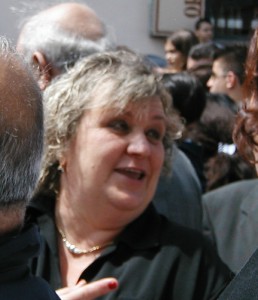 me – the beautiful, the fascinating, the crooked, the old, the toddling, the dour, the sweet, the desperate – they all deserve a good hug, and when that
me – the beautiful, the fascinating, the crooked, the old, the toddling, the dour, the sweet, the desperate – they all deserve a good hug, and when that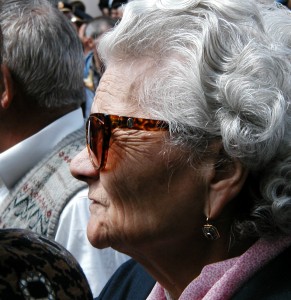 cannot happen physically without causing a stir, there’s always a mental alternative. Is it Italy that does this? Is it the flood? What is that flood made of, anyway? What is Italy?
cannot happen physically without causing a stir, there’s always a mental alternative. Is it Italy that does this? Is it the flood? What is that flood made of, anyway? What is Italy?
Italy is a place made fascinating by a difficult past, a challenging present, and traditions that treat such obstacles as unworthy excuses for neglecting enjoyment of good food, good company, and the good experience of seasonal rotation; each season special, each brimming with potential for a delicious and festive sagra. Enter a Californian who views his past as a placid pond and with only a vague memory of what a season is, but who has nevertheless found ways to suffer dearth in the midst of plenty. Bang the two together. What do you get?
I’m talking too much. Pass the polenta, would you please? Now then, what was it we were discussing?
